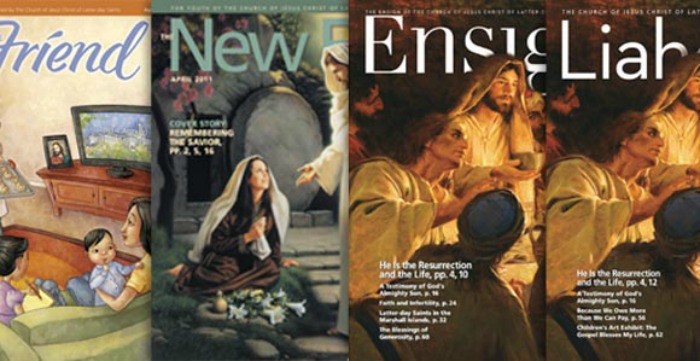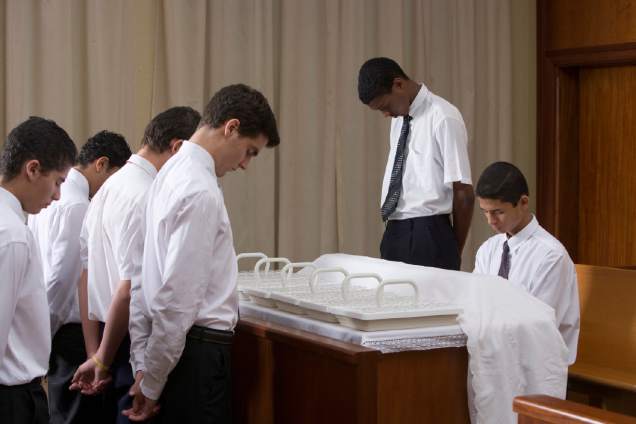Question
Dear Gramps,
My friends and I had a long discussion about knowledge. Often, I hear people at the pulpit testify that they “know” something is true. We considered the idea that while the standard error for things we strongly believe could be very small (99.99% confidence), in this life we likely can never know 100% that something is true. However at the same time, the scriptures and the prophet and apostles themselves often use the words “know” and “knowledge.” Can we really know anything 100%?
Robby
Answer
Robby,
When I attended college, long time ago, I often heard the following statement, “You can’t know anything for sure.” This sentiment follows what you have expressed, “in this life we likely can never know 100% that something is true.” In correlation with this, I find the irony a bit amusing due to how often I would read or hear someone say that this scientific theory is a “fact,” — 100% for sure. As an example, when you take a moment to review common popular theories — scientific theories (that you can’t know anything for sure) — how often followers of these theories speak as though there is no other way, possibility. What then is true?
In light of the previous thought, here is something a friend had me think about. Take a moment to think upon what we consider “certainties” today. The earth is round. Americas moon landing was not fake. Matter cannot be destroyed, and if anyone disagrees with these “certainties” they are often met with much discord and rude name calling. Yet, a good majority of these people who specify the earth is round (including myself) probably have never done any experiments to confirm themselves that the earth in fact is round. That America did indeed land on the moon, and that matter cannot be destroyed (we trust what we have read and what we have been told). Yet, with certainty, we who haven’t done any of the tests and research (we have seen pictures, because pictures can never be faked and would never be faked by multiple sources) proclaim the earth is round, matter can’t be destroyed, and that America did moon land.
So, let’s now get to the heart of your question pertaining to spiritual confirmation and our ability to know to any level of degree (even 100%). The subject of knowing will cover the following topics:
1) A God that Cannot Lie
2) Witness from the Holy Ghost and Spiritual Gifts
3) Faith in relation to a perfect knowledge and our faith “in a thing” becoming dormant.
4) Hope with surety
5) Visions and Dreams
6) The testimony of Elder Oaks and Elder Packer
A God that Cannot Lie
Our scriptures highlight an important element to your question regarding — a God that can’t lie. The scriptures are: Ether 3:11-12, Jacob 4:13, and Titus 1:2. The conversation between the Lord and the brother of Jared I find enlightening. At one point the Lord says to the brother of Jared, “And the Lord said unto him: Believest thou the words which I shall speak?” The brother of Jared’s response is, “And he answered: Yea, Lord, I know that thou speakest the truth, for thou art a God of truth, and canst not lie.”
Here are some questions for you to ponder in relation to this dialogue between the Lord and the brother of Jared. If a person knows the voice of the Lord through his Holy Spirit, is that knowledge (which comes by faith)? Did the brother of Jared receive knowledge or some standard error although God can’t lie?
It appears pretty clear there wasn’t any standard error for the brother of Jared, and this is evidenced by the result of his knowledge. What a great principle of truth taught in scripture that allows us to place 100% trust in a God that cannot lie.
Witness from the Holy Ghost and Spiritual Gifts
In relation to a God that can’t lie, let’s review the witness then from the Spirit of Truth and gifts of the Spirit. We will first begin with the gifts of the Spirit as there are two gifts that are important to your question:
1) Doctrine and Covenants 46:13, “To some it is given by the Holy Ghost to know that Jesus Christ is the Son of God, and that he was crucified for the sins of the world.”
2) Doctrine and Covenants 46:14, “To others it is given to believe on their words, that they also might have eternal life if they continue faithful.”
Let’s begin with the second verse which actually confirms what you are expressing. There are some members of the Church who may “know” because of the gift to believe on others. If a person is believing the witness of another and they share their testimony, then the logical conclusion is they are truly speaking from a state of belief, not knowledge themselves. Is this wrong though? Is this something to discourage because their gift, which will lead to their exaltation, is not 100% knowledge? No! So, I would caution any member of the Church to minimize a person’s witness, because it is still a gift from God.
The first verse though doesn’t speak of any standard of error, as we are dealing with a God that can’t lie. When a person receives witness from the Holy Ghost (a member of the Godhead) that is knowledge. There isn’t any standard error that makes the witness of the Holy Ghost go from 100% to 99%, or any percentage less than 100%. This brings us to the next point, how our faith can become dormant “in a thing.”
Faith in relation to a perfect knowledge and our faith “in a thing” becoming dormant.
Let’s first open with the definition of faith as found in the Book of Mormon within Alma 32:21, “And now as I said concerning faith—faith is not to have a perfect knowledge of things; therefore if ye have faith ye hope for things which are not seen, which are true.”
1) Faith is not a perfect knowledge
2) Faith is a hope for things not seen
3) Faith is exercised in those things which are true
Through our faith we receive witness in those things which are true. Truth is the knowledge of things as they are, as they were, and as they are to come. Truth is something we can 100% rely upon. One day, while I was reading the scriptures the Spirit of the Lord (the Spirit of truth) emphasized a verse of scripture I had read many times before but did not ever think about in Alma 32:34, “And now, behold, is your knowledge perfect? Yea, your knowledge is perfect in that thing, and your faith is dormant; and this because you know, for ye know that the word hath swelled your souls, and ye also know that it hath sprouted up, that your understanding doth begin to be enlightened, and your mind doth begin to expand.”
The initial question upon receiving witness from the Holy Ghost is the following question, “Is your knowledge perfect”? The answer this scripture provides is yes your knowledge is perfect and I love the additional thought, “in that thing, and your faith is dormant.” In light of this verse and according to your question, if our knowledge is perfect — in a thing — does this mean we have a standard error of knowledge, or do we actually have knowledge?
I find the answer very simple, we have knowledge. Not a standard error of knowledge, we in fact do have knowledge as received by the Holy Ghost, or the Spirit of truth which “lieth not.”
Let’s be frank though right, there are some experiences that give additional witness, temporal witness, that Jesus is the Christ. Let’s remember Joseph Smith’s experience when he saw Heavenly Father and Jesus Christ and they both spoke to him. That is knowledge both temporal and spiritual. I also find it interesting that Adam and Eve are the only two people (as far as I can tell from scripture) who never exercised faith pertaining to knowing God the Father and his Son, Jesus Christ (but that is a different topic).
Also, in relation to the gift of the Spirit to know by the Holy Ghost we have the following verse in our Book of Mormon in Alma 39:6, “For behold, if ye deny the Holy Ghost when it once has had place in you, and ye know that ye deny it, behold, this is a sin which is unpardonable; yea, and whosoever murdereth against the light and knowledge of God, it is not easy for him to obtain forgiveness; yea, I say unto you, my son, that it is not easy for him to obtain a forgiveness.”
Isn’t it interesting that if a person sees an angel (knowledge) and then denies that experience we do not have any scripture that specifies condition that this may be unpardonable. Yet, we know that denying the Holy Ghost does. In this verse of scripture we can read the following points made by Alma to his son Corianton:
1) A person denies the Holy Ghost once it has had place in them
2) If the person “knows” they deny it
3) Then this sin may be unpardonable but we are given clarification that it is “not easy” to obtain forgiveness
The witness from the Holy Ghost, the gift to know, is not a standard error of less than 100%. It is knowledge, otherwise the witness becomes like any other witness and can’t fully be trusted. As we can trust a true witness from the Holy Ghost (a member of the Godhead who can’t lie, but only speak truth). Thus, we can proclaim knowledge, and the statement “I know” is accurate. In light of this let further review some other scriptures that give more light to this.
Hope with surety
In the book of Ether we are able to read the following verse of scripture, “Wherefore, whoso believeth in God might with surety hope for a better world, yea, even a place at the right hand of God, which hope cometh of faith, maketh an anchor to the souls of men, which would make them sure and steadfast, always abounding in good works, being led to glorify God.”
This is one of my favorite verses in scripture, when I received witness from the Holy Ghost teaching me something true. The Spirit allowed me to recognize the word before “hope” — surety. If I said to you that I know something with surety, would you think I meant something less than 100%? The witness, and purpose of the Holy Ghost is for us to know — with surety. Not a statement of, “Well, I know this but I really don’t know this because my knowledge is a standard error of 100%.
Visions and Dreams
When the Lord visited Lehi in a dream/vision, do you think he left Jerusalem with 99% confidence this was right choice, or with 100%? This section doesn’t need to go into any further discussion. This is simply another method by which the Lord will reveal his truth, and a truth we can know with surety.
The testimony of Elder Oaks and Elder Packer
This section is to provide you with some additional thoughts from some of the Lord’s beloved servants. Elder Oaks, 2008, shared the following thought,
“What do we mean when we testify and say that we know the gospel is true? Contrast that kind of knowledge with “I know it is cold outside” or “I know I love my wife.” These are three different kinds of knowledge, each learned in a different way. Knowledge of outside temperature can be verified by scientific proof. Knowledge that we love our spouse is personal and subjective. While not capable of scientific proof, it is still important. The idea that all important knowledge is based on scientific evidence is simply untrue.”
Elder Packer in 1982 shared the following thoughts from an experience he had with an atheist. He shares:
“I will tell you of an experience I had before I was a General Authority which affected me profoundly. I sat on a plane next to a professed atheist who pressed his disbelief in God so urgently that I bore my testimony to him. “You are wrong,” I said, “there is a God. I know He lives!”
He protested, “You don’t know. Nobody knows that! You can’t know it!” When I would not yield, the atheist, who was an attorney, asked perhaps the ultimate question on the subject of testimony. “All right,” he said in a sneering, condescending way, “you say you know. Tell me how you know.”
The conversation continued with Elder Packer explaining how he knows, “When I used the words Spirit and witness, the atheist responded, “I don’t know what you are talking about.” The words prayer, discernment, and faith, were equally meaningless to him. “You see,” he said, “you don’t really know. If you did, you would be able to tell me how you know.”
As the conversation continued Elder packer then shares a concluding statement after the atheist could not accurate describe the taste of salt to someone who had never tasted salt, “After several attempts, of course, he could not do it. He could not convey, in words alone, so ordinary an experience as tasting salt. I bore testimony to him once again and said, “I know there is a God. You ridiculed that testimony and said that if I did know, I would be able to tell you exactly how I know. My friend, spiritually speaking, I have tasted salt. I am no more able to convey to you in words how this knowledge has come than you are to tell me what salt tastes like. But I say to you again, there is a God! He does live! And just because you don’t know, don’t try to tell me that I don’t know, for I do!”
In light of my previous thoughts and witness from two apostles of our Lord when I specify in testimony “I know” it is because I know, notwithstanding any standard error some other person would like to place on my statement. If a person wants to believe such, they are welcome to believe their own state of knowledge and experience. I also recognize that because my knowledge is perfect “in that thing” (the Holy Ghost has given witness of) my knowledge is not perfect in everything, and thus I continue to exercise faith (an imperfect knowledge) toward principles and truths I have not as yet received witness of. This is simply the process toward perfection to become like my Father in heaven and his Son, Jesus Christ.
Gramps







